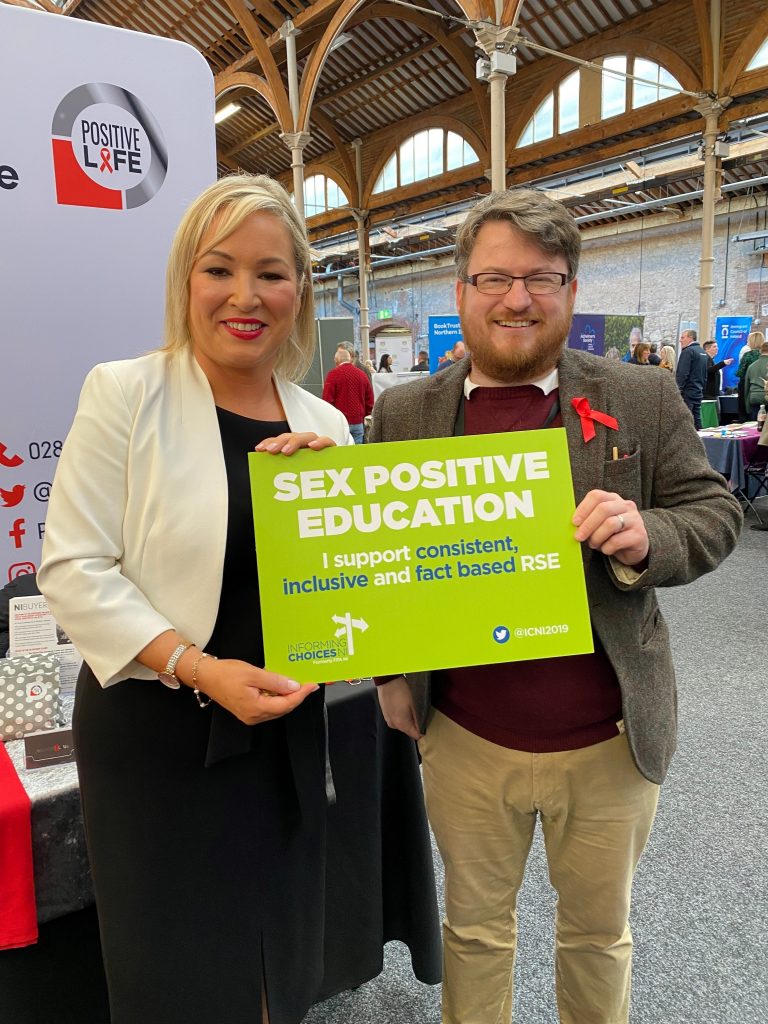
We campaign for comprehensive and scientifically accurate Relationships and Sexuality Education (RSE).
On 6 June 2023 the UK government announced that it was updating the RSE curriculum in Northern Ireland. The Secretary of State was under a legal duty to act following legislation passed by the UK Parliament. This followed recommendations made by the United Nations Committee on the Elimination of Discrimination Against Women. Following an inquiry into access to abortion in Northern Ireland the Committee recommended that the UK government:
“Make age-appropriate, comprehensive, and scientifically accurate education on sexual and reproductive health and rights a compulsory component of the curriculum for adolescents, covering prevention of early pregnancy and access to abortion, and monitor its implementation.”
RSE Consultation
After the Relationships and Sexuality Education (Northern Ireland) (Amendment) Regulations 2023 were introduced, the Department of Education published a consultation. This sought views regarding the legislation and the ability of parents to exclude their children from RSE lessons. You can view our response here. The change in legislation followed a series of reports and surveys which recommended RSE reform, some of which are outlined below.
Marshall Inquiry
In 2014 an Inquiry into Child Sexual Exploitation in Northern Ireland published a report. This stated that young people reported that RSE lessons rarely addressed same-sex relationships. Young people stated that RSE is poor, and called for the delivery of a wider and more consistent curriculum.
Gillen Review
In 2019 an independent review into how the criminal justice system in Northern Ireland deals with serious sexual offence cases made a series of recommendations. This included the need to include issues such as relationships, consent, homophobia and gender identity within the school curriculum.
Any Use Report
In 2019 the Belfast Youth Forum published research into RSE. Within it young people described the RSE they received to be ‘basic’, ‘unhelpful’, ‘useless’ and ‘biased’. 86% felt that school was the best place to receive RSE. However, only 66% said they had actually received it. 60% felt that the information they received was either ‘not very useful’ or ‘not useful at all’. The research recommended the adoption of a rights-based and proactive approach to RSE. It stated that a curriculum programme should be co-produced with young people, and that specialist staff deliver the subject.
MLA Survey
In 2022 a survey commissioned by ICNI highlighted that only 17% of MLAs believed RSE in schools to be ‘satisfactory’. 78% agreed that there should be a standardised curriculum used in all schools, regardless of their ethos. 70% supported the introduction of a new Sexual Health Strategy. 62% agreed that children and young people should be taught about different family types. 60% agreed that information regarding contraception and access to abortion should be included within all post-primary schools.
Education and Training Inspectorate
In 2023 the Education and Training Inspectorate published a Thematic Evaluation of the Preventative Curriculum in Northern Ireland. The report was based on responses from over 14,500 pupils and 500 schools. It found that there was considerable variation in the teaching of RSE and highlighted a lack of lessons on topics such as consent, domestic abuse, gender, contraception, pregnancy, abortion, and menstrual health and wellbeing. Only 44% of schools reported that they were delivering the topic of consent to a small extent, or not at all.
Northern Ireland Human Rights Commission
In 2023 the Northern Ireland Human Rights Commission published a report on RSE in Post Primary Schools in Northern Ireland. This followed an investigation they undertook in this area. The report makes a series of recommendations regarding the implementation and monitoring of RSE. These include that the Department of Education should support schools to include students in co-developing and evaluating RSE policies.
We believe:
- All children and young people should have access to age-appropriate, comprehensive and scientifically accurate RSE in schools;
- RSE should start early and be relevant to children and young people at each stage of their development;
- There should be a standardised RSE curriculum across all schools in Northern Ireland, regardless of their ethos;
- RSE should be inclusive, and facilitated by trainers who are confident in talking about all issues relevant to the subject;
- RSE Awareness Training should be provided to all teaching staff;
- Programmes should be offered to parents and guardians; and
- All lessons should be assessed and evaluated to ensure consistency, with young people playing a key role in this process.
